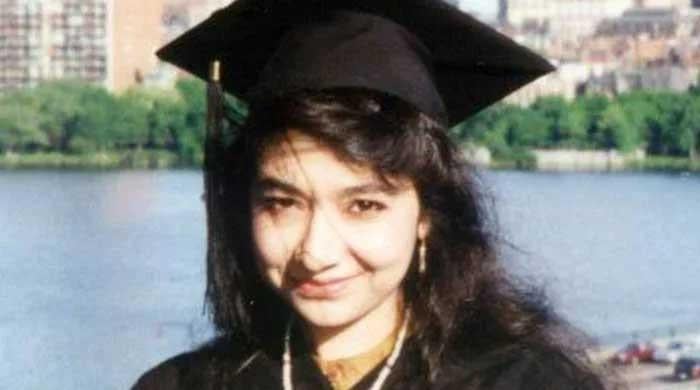‘Still hopeful for justice’, Dr Aafia Siddiqui tells Pakistan delegation

- Three-member Pakistani delegation meets Dr Aafia at FMC Carswell.
- Dr Aafia apprises Senators Busrha, Talha of difficulties faced by her.
- Talks with US authorities for Dr Aafia’s release positive, says Bushra.
A Pakistani delegation, upon the direction of Prime Minister Shehbaz Sharif, has held an hours-long meeting with imprisoned Dr Aafia Siddiqui who has been languishing in US prison for more than 10 years.
The meeting, which continued for around three hours, took place at the US prison where Dr Aafia is incarcerated and was attended by Senators Bushra Anjum and Talha Mahmood along with psychiatrist Dr Iqbal Afridi.
During the meeting, as per Senator Bushra, the Pakistani scientist apprised the delegation of the difficulties she was facing. However, Dr Aafia said that she still hopes to get justice, added the lawmaker.
The Pakistani neuroscientist was handed down an 86-year sentence in 2010 on charges of attempted murder and assault of US personnel in Afghanistan jail. She is serving the jail term in Carswell, a high-security prison in, Fort Worth, Texas which houses female inmates of all security levels.
The delegation’s visit is part of Pakistan’s efforts to secure Dr Aafia’s release which has time again urged Washington to consider and re-evaluate her case.
Apart from meeting the incarcerated scientist, the Pakistani delegation also met US Congress and State Department officials urging them to release her.
“Talks with US authorities for the release of Aafia Siddiqui were positive [….] It is hoped that the US government will decide on the release of Dr Aafia Siddiqui before January 20 [Inauguration Day for President-elect Donald Trump,” said Senator Bushra.
Her remarks come as in October PM Shehbaz had written to US President Joe Biden seeking his intervention in the matter which, he said, deserved to be viewed with compassion.
“Now 52 years old, she has spent approximately sixteen years behind bars in the US,” said PM Shehbaz in the letter.
The premier further mentioned that numerous Pakistani officials have paid consular visits to the Pakistani scientist at the prison facility over the years and have raised “serious concerns about the treatment she has received”.
The treatment meted out to her has severely impacted her “already fragile mental and frail physical health”.
“In fact, they even fear that she could take her own life,” the prime minister mentioned in the letter.
“Keeping these facts in view, I request you, Mr President, to kindly exercise your constitutional authority and accept Dr [Aafia] Siddiqui’s clemency petition and order her release, strictly on humanitarian grounds,” he wrote urging the American president to pardon the neuroscientist.
Torture, sexual abuse
Meanwhile, last month Geo News reported that Dr Aafia had filed a comprehensive federal lawsuit against the US government, the Federal Bureau of Prisons, and several prison officials over alleged torture, sexual abuse and religious discrimination.
The detailed 61-page lawsuit — filed nearly two months ago in the US District Court for the Northern District of Texas — accuses prison staff of severe violations of her constitutional and human rights.
The complaint, filed by attorneys Naim Haroon Sakhia, Maria Kari, and Clive Stafford Smith, provides a harrowing account of Dr Aafia’s alleged mistreatment.
The Pakistani scientist, as per the complaint, endured repeated sexual assaults and physical abuse by prison staff and fellow inmates since her incarceration at FMC Carswell.
These acts were not isolated incidents but part of a systemic culture of abuse within the facility, it added.
The lawsuit also claims that she was allegedly doused with a burning, acidic liquid by prison staff in retaliation for reporting her abuse.
It also cites multiple instances where Dr Aafia’s religious rights were violated, including male officers watching her during private moments, forcing her to strip, and confiscating religious items.
Furthermore, inadequate medical treatment has also been highlighted despite the neuroscientist’s documented PTSD and physical ailments stemming from alleged torture in the US custody prior to her trial.









